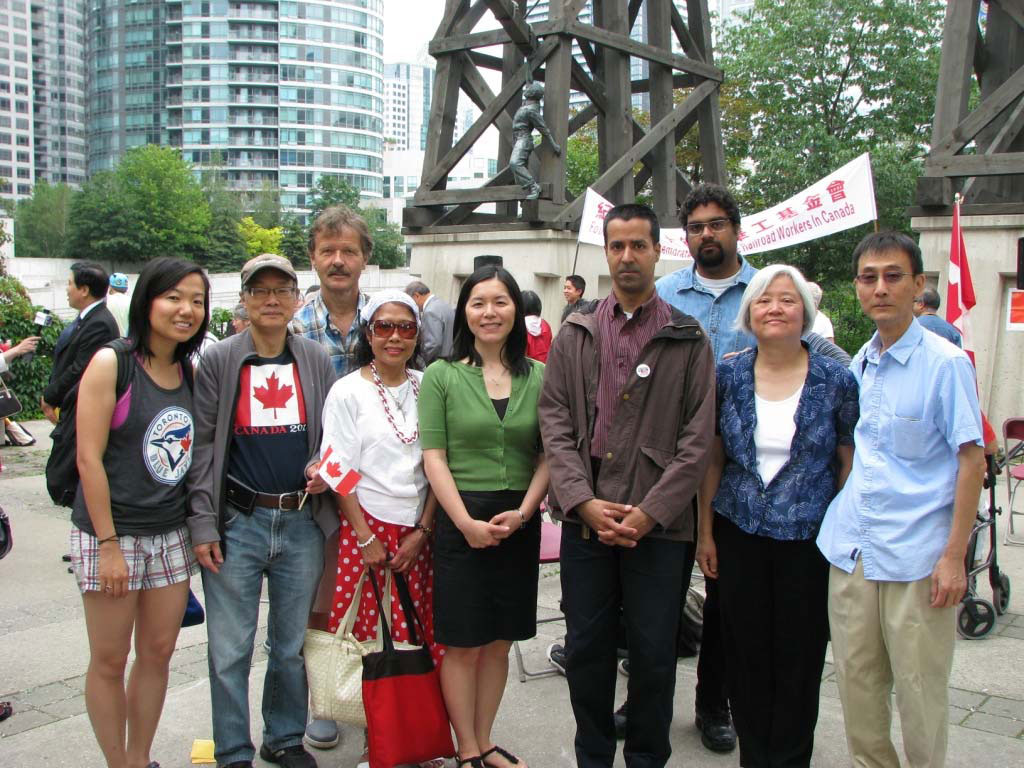歷史正重演 這是不對的 | 历史正重演 这是不对的

加拿大國慶日鐵路華工紀念碑獻花儀式 2013
多倫多及約克區勞工議會、亞裔加拿大勞工聯盟的代表,出席加拿大國慶日鐵路華工紀念碑獻花儀式
Members of Toronto and York Region Labour Council, and Asian Canadian Labour Alliance attending the Commemoration of Chinese Railroad Workers on Canada Day 2013
Image by: Leonard Yeung
加拿大鐵路華工基金會每年主辦,加拿大國慶日到多倫多市中心鐵路華工紀念碑獻花儀。亞裔加拿大勞工聯盟(ACLA)應邀出席,這是代表Anna Liu 致詞譯文:更多
感謝主辦者邀請亞裔加拿大勞工聯盟(ACLA)參加每年一度向鐵路華工致敬, 表揚他們貢獻的聚會。
在華人社區,加拿大被稱為「金山」,意思是機會與繁榮的地方。
好幾代華人視加拿大為充滿希望和運氣的地方。
鐵路華工的故事悲喜交集。
這是希望和適應的故事,但這也是關於艱苦、犠牲和種族排斥的故事。
加拿大首任總理約翰‧A ‧麥當勞爵士(Sir John A. MacDonald) ,堅持削減建造加拿大太平洋鐵路的成本,遊說引入華工以降低勞工支出。
這是比較便宜的另一個選擇,使旨在從英國殖民地引進有英國人血統的白人移民/開拓的更詳盡建議黯然失色。
2006年,加拿大為其對華工及他們家庭令人遺憾的待遇,向華人社區正式道歉。
雖然在這方面承認錯誤對待,加拿大政府還沒有從過去的錯誤中學習。
今日,我們仍然看到加拿大使用外勞。
沒有太大的改變,除了現在外勞從世界各地而來,主要是南半球。
令人沮喪的是加拿大繼續實施類似的排斥性做法。
華人移民法或排華法,現今以重新包裝的臨時外勞計劃取而代之。
這些計劃容許工人進入加拿大做加拿大人不願排隊去做的工作。
他們受僱為我們的食物日曬雨淋在農地收割。他們受僱照顧老幼,因為我們的國家缺乏妥善照顧老幼的全國性策略。
作為一個國家,我們極度依賴這些工人。
但是,他們沒有獲得公平對待,以及他們沒有同加拿大工人一樣的保護和權利。
他們受歡迎到加拿大為低薪打工,但他們不獲准逗留。
歷史正在重演,這是不對的。
這樣的活動,對亞裔加拿大勞工聯盟(ACLA)尤為重要。
首先,這是一個幫助我們紀念過去亞裔工人艱苦奮鬥的機會。
其次,它提醒我們注意我們現時所處理的問題的連結。
最後也是最重要的,它告知和啟發我們制定前進路綫圖。
亞裔工人在加拿大已走過漫漫長路,但是,仍有很多工作在前面等著去做。
加拿大铁路华工基金会每年主办,加拿大国庆日到多伦多市中心铁路华工纪念碑献花仪。亚裔加拿大劳工联盟(ACLA)应邀出席,這是代表Anna Liu 致词译文:更多
感谢主办者邀请亚裔加拿大劳工联盟(ACLA)参加每年一度向铁路华工致敬, 表扬他们贡献的聚会。
在华人社区,加拿大被称为「金山」,意思是机会与繁荣的地方。
好几代华人视加拿大为充满希望和运气的地方。
铁路华工的故事悲喜交集。
这是希望和适应的故事,但这也是关于艰苦、犠牲和种族排斥的故事。
加拿大首任总理约翰‧A ‧麦当劳爵士(Sir John A. MacDonald) ,坚持削减建造加拿大太平洋铁路的成本,游说引入华工以降低劳工支出。
这是比较便宜的另一个选择,使旨在从英国殖民地引进有英国人血统的白人移民/开拓的更详尽建议黯然失色。
2006年,加拿大为其对华工及他们家庭令人遗憾的待遇,向华人社区正式道歉。
虽然在这方面承认错误对待,加拿大政府还没有从过去的错误中学习。
今日,我们仍然看到加拿大使用外劳。
没有太大的改变,除了现在外劳从世界各地而来,主要是南半球。
令人沮丧的是加拿大继续实施类似的排斥性做法。
华人移民法或排华法,现今以重新包装的临时外劳计划取而代之。
这些计划容许工人进入加拿大做加拿大人不愿排队去做的工作。
他们受雇为我们的食物日晒雨淋在农地收割。他们受雇照顾老幼,因为我们的国家缺乏妥善照顾老幼的全国性策略。
作为一个国家,我们极度依赖这些工人。
但是,他们没有获得公平对待,以及他们没有同加拿大工人一样的保护和权利。
他们受欢迎到加拿大为低薪打工,但他们不获准逗留。
历史正在重演,这是不对的。
这样的活动,对亚裔加拿大劳工联盟(ACLA)尤为重要。
首先,这是一个帮助我们纪念过去亚裔工人艰苦奋斗的机会。
其次,它提醒我们注意我们现时所处理的问题的连结。
最后也是最重要的,它告知和启发我们制定前进路线图。
亚裔工人在加拿大已走过漫漫长路,但是,仍有很多工作在前面等着去做。
The speech of Anna Liu, Co-Chair of Asian Canadian Labour Alliance, at the Ceremony to Commemorate the Chinese Railroad Workers on July 1, 2013:more
Thank you to the event organizers for inviting ACLA to bring greetings and for organizing this annual gathering to recognize the contribution of Chinese railroad workers.
In the Chinese community, Canada is known as “GoldMountain” meaning land of opportunity and prosperity.
Generations of Chinese have looked to Canada as a place of hope and good fortune.
For Chinese railroad workers, their story is bittersweet.
It is a story of hope and resilience, but it also a story about hardship, sacrifice, and racial exclusion.
The first Prime Minister of Canada, Sir John A. MacDonald, insisted on cutting costs in building the Canadian Pacific Railway and campaigned to bring in Chinese workers to lower labour costs.
This was the less expensive, alternative option which overshadowed a more elaborate immigration/settlement proposal aimed at bringing in the preferred white Anglo-Saxon workers from British colonies.
In 2006, Canada formally apologized to the Chinese community for it unfortunate treatment of these workers and their families.
While there is recognition of mistreatment on this front, the Canadian government has not learned from past mistakes.
Today, we continue to see Canada use migrant labour.
Not much has changed, except the workers are coming from all over the world now, mainly from the global south.
What is disheartening is Canada has continued to implement similar exclusionary practices.
Instead of the Chinese Immigration Act or the Chinese Exclusion Act, it is now repackaged as the Temporary Foreign Worker Program.
These programs allow workers to come into Canada to do work that Canadians are not lining up to do.
They are recruited to work in the fields in rain or shine harvesting the food that we eat. They are the private caregivers for our children and elders because our country lacks a national strategy to properly care for our young and old.
As a country, we heavily rely on these workers.
However, they are not treated equally and they lack the same protections and rights as Canadian workers.
They are welcomed to labour in Canada for low wages, but they are not allowed to stay.
History is repeating itself and this is wrong.
For ACLA, events such at this one are particularly important.
First, it is an opportunity to help us remember the past struggles of Asian workers.
Second, it reminds us about the links to the issues we are currently dealing with today.
Lastly and most importantly, it can inform and inspire us to chart the path forward.
Asian workers have come along way in Canada, but more work lies ahead.





